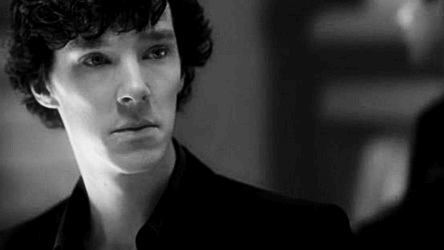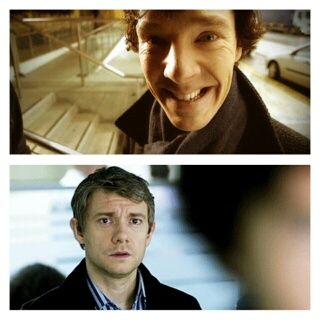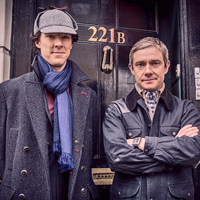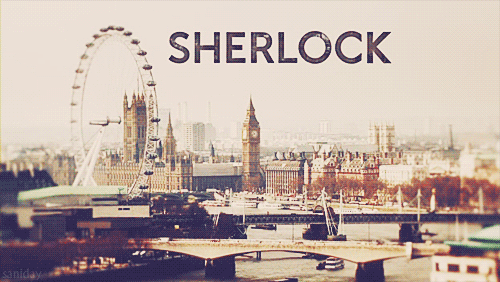
BBC Sherlock Fan Forum - Serving Sherlockians since February 2012.
- ukaunz
- High Functioning Sociopath
 Offline
Offline 
- From: Australia
- Registered: February 13, 2015
- Posts: 2,584
Re: The Imitation Game (spoiler thread for those who have seen it)
Netflix is new to Australia and is available only as online streaming as far as I know. I don't think there is a DVD postal service here, but I could be wrong. I could easily rent a DVD but hate paying $7 to have it for one night, and the waiting, and the fact that the discs are usually scratched... I could rent it online, but if I have to pay, I'd rather get it to watch at my leisure as many times as I want ![]() I put in a purchase request at the library ages ago and thought I'd be higher on the wait list (get in before the discs get too scratched), and that they would buy more copies!
I put in a purchase request at the library ages ago and thought I'd be higher on the wait list (get in before the discs get too scratched), and that they would buy more copies!
----------------------------------------------------------------------------------------------------------------------------------------------------


- ukaunz
- High Functioning Sociopath
 Offline
Offline 
- From: Australia
- Registered: February 13, 2015
- Posts: 2,584
Re: The Imitation Game (spoiler thread for those who have seen it)
I found a place that is selling the DVD for about $16... I suppose I could get it for myself as a Mother's Day present ![]()
----------------------------------------------------------------------------------------------------------------------------------------------------


- tonnaree
- The "B" is SILENT! (Mod)
 Offline
Offline 
- From: Atlanta, Georgia, USA
- Registered: May 31, 2013
- Posts: 9,270
Re: The Imitation Game (spoiler thread for those who have seen it)
ukaunz wrote:
I found a place that is selling the DVD for about $16... I suppose I could get it for myself as a Mother's Day present
Do It!
Do It!
DO IT! ![]()
----------------------------------------------------------------------
Proud President and Founder of the OSAJ.
Honorary German
"Anyone who takes himself too seriously always runs the risk of looking ridiculous; anyone who can consistently laugh at himself does not".
-Vaclav Havel
"Life is full of wonder, Love is never wrong." Melissa Ethridge
I ship it harder than Mrs. Hudson.


- diva
- John's Army
 Offline
Offline 
- Registered: June 12, 2014
- Posts: 274
Re: The Imitation Game (spoiler thread for those who have seen it)
I finally bought the DVD while I was in London a few weeks ago from hmv for GBP 6.99, and when I opened it I found a voucher for a 20% discount on a standard admission ticket to visit Bletchley Park. Now that's what I call a bargain!
I had already planned to go to Bletchley Park anyway and after spending half a day on the site I highly recommend a visit. It is a beautiful place and the exhibition is very educational. The ticket is valid for one year from the day of purchase so I will most probably use it when I am in London again for the BBC Proms and Hamlet in August. Bletchley Park is less than an hour by train from Euston Station so I first went to Speedy's for a nice coffee before I boarded the train. If you go to Bletchley Park until November 1st you can see a special exhibition about the making of The Imitation Game with costumes and props from the film set. 




O, learn to read what silent love hath writ:
To hear with eyes belongs to love’s fine wit.
(Shakespeare, Sonnet 23)
- SusiGo
- The game is never over (moderator)
 Offline
Offline 
- From: Germany
- Registered: June 5, 2012
- Posts: 22,965
Re: The Imitation Game (spoiler thread for those who have seen it)
Thank you for sharing, diva, this looks amazing. If possible, I will try and go there during my Hamlet trip in September.
------------------------------
"To fake the death of one sibling may be regarded as a misfortune; to fake the death of both looks like carelessness." Oscar Wilde about Mycroft Holmes
"It is what it is says love." (Erich Fried)
“Enjoy the journey of life and not just the endgame. I’m also a great believer in treating others as you would like to be treated.” (Benedict Cumberbatch)

- •
- This Is The Phantom Lady
- Threatened Knighthood
 Offline
Offline 
- From: Home of Hamlet (Denmark)
- Registered: February 6, 2014
- Posts: 10,183
Re: The Imitation Game (spoiler thread for those who have seen it)
That is awesome! Thank you for sharing!!
What a lucky chance for you!
~~~~~~~~~~~~~~
"Don't talk out loud, you lower the IQ of the whole street!"

"Oh Watson. Nothing made me... I made me"
"Luuuuurve Ginger Nuts"
Tumblr[/url] I [url=]AO3
#IbelieveInSeries5
- Davina
- Moderator
 Offline
Offline 
- From: The Only Way is Essex UK
- Registered: February 9, 2012
- Posts: 9,714
Re: The Imitation Game (spoiler thread for those who have seen it)
Looks amazing!
![]()
---------------------------------------------------------------------------------------------------------------------------------------------
Don't make people into heroes John. Heroes don't exist and if they did I wouldn't be one of them.

- diva
- John's Army
 Offline
Offline 
- Registered: June 12, 2014
- Posts: 274
Re: The Imitation Game (spoiler thread for those who have seen it)
Not sure if this has been posted before but I only just came across this blog with some interesting details about the design of the various documents, papers and other stuff used in the film.
O, learn to read what silent love hath writ:
To hear with eyes belongs to love’s fine wit.
(Shakespeare, Sonnet 23)
- SusiGo
- The game is never over (moderator)
 Offline
Offline 
- From: Germany
- Registered: June 5, 2012
- Posts: 22,965
Re: The Imitation Game (spoiler thread for those who have seen it)
Thank you very much, great article. I wish they had been more appreciated, also in form of awards, for the amazing production design.
------------------------------
"To fake the death of one sibling may be regarded as a misfortune; to fake the death of both looks like carelessness." Oscar Wilde about Mycroft Holmes
"It is what it is says love." (Erich Fried)
“Enjoy the journey of life and not just the endgame. I’m also a great believer in treating others as you would like to be treated.” (Benedict Cumberbatch)

- •
- Harriet
- Most Human Human Being
 Offline
Offline 
- From: 110A Piccadilly
- Registered: August 24, 2012
- Posts: 9,887
Re: The Imitation Game (spoiler thread for those who have seen it)
Oh, thank you, diva, for the pictures ![]()
Eventually everyone will support Johnlock. Independent OSAJ Affiliate
... but there may be some new players now. It’s okay. The East Wind takes us all in the end.
- tonnaree
- The "B" is SILENT! (Mod)
 Offline
Offline 
- From: Atlanta, Georgia, USA
- Registered: May 31, 2013
- Posts: 9,270
Re: The Imitation Game (spoiler thread for those who have seen it)
Want to leave this here. It might be of interest to those fascinating by Turing.
SPEAK by Louisa Hall
A thoughtful, poignant novel that explores the creation of Artificial Intelligence—illuminating the very human need for communication, connection, and understanding.In a narrative that spans geography and time, from the Atlantic Ocean in the seventeenth century, to a correctional institute in Texas in the near future, and told from the perspectives of five very different characters, Speak considers what it means to be human, and what it means to be less than fully alive.A young Puritan woman travels to the New World with her unwanted new husband. Alan Turing, the renowned mathematician and code breaker, writes letters to his best friend’s mother. A Jewish refugee and professor of computer science struggles to reconnect with his increasingly detached wife. An isolated and traumatized young girl exchanges messages with an intelligent software program. A former Silicon Valley Wunderkind is imprisoned for creating illegal lifelike dolls.Each of these characters is attempting to communicate across gaps—to estranged spouses, lost friends, future readers, or a computer program that may or may not understand them. In dazzling and electrifying prose, Louisa Hall explores how the chasm between computer and human—shrinking rapidly with today’s technological advances—echoes the gaps that exist between ordinary people. Though each speaks from a distinct place and moment in time, all five characters share the need to express themselves while simultaneously wondering if they will ever be heard, or understood.
Last edited by tonnaree (July 17, 2015 2:07 pm)
----------------------------------------------------------------------
Proud President and Founder of the OSAJ.
Honorary German
"Anyone who takes himself too seriously always runs the risk of looking ridiculous; anyone who can consistently laugh at himself does not".
-Vaclav Havel
"Life is full of wonder, Love is never wrong." Melissa Ethridge
I ship it harder than Mrs. Hudson.


- Davina
- Moderator
 Offline
Offline 
- From: The Only Way is Essex UK
- Registered: February 9, 2012
- Posts: 9,714
Re: The Imitation Game (spoiler thread for those who have seen it)
Sounds really interesting!
![]()
---------------------------------------------------------------------------------------------------------------------------------------------
Don't make people into heroes John. Heroes don't exist and if they did I wouldn't be one of them.

- IBelieveinSH
- Shooting The Wall
 Offline
Offline 
- Registered: August 12, 2015
- Posts: 12
Re: The Imitation Game (spoiler thread for those who have seen it)
I just watched this film a couple days ago, being a new fan of Cumberbatch, and wow...just wow.
The last scene especially ripped my heart out! ![]() I feel it was definitely eye opening to the youth that don't understand that homosexuality was not only frowned upon in the past, but completely illegal and punishable to the same extent as henious crimes.
I feel it was definitely eye opening to the youth that don't understand that homosexuality was not only frowned upon in the past, but completely illegal and punishable to the same extent as henious crimes.
Looking through some of the earlier posts on this thread, I can completely understand why people could be upset by Turing's sexuality always shown in a negative light. But I believe it fits the times perfectly. Throwing in a sex scene, even subtly, is unnecessary and would instantly turn away the "homophobic" crowd, which I believe could benefit greatly in understanding by watching this film.

BRAINY IS THE NEW SEXY
- Yitzock
- Stayin' Alive
 Offline
Offline 
- From: Canada
- Registered: May 5, 2015
- Posts: 3,882
Re: The Imitation Game (spoiler thread for those who have seen it)
I would agree. I don't think that part of Turing is demonized at all overall, but of course there are going to be unaccepting people - that was the way it was and that's part of Turing's and the world's story. We've come a long way since then. Hopefully there will never be another brilliant person who is treated so badly for a part of themselves that they can't change.


Clueing for looks.
- tea&ash
- Not A Hero
 Offline
Offline 
- Registered: September 12, 2015
- Posts: 49
Re: The Imitation Game (spoiler thread for those who have seen it)
@ diva, Those are some amazing photos! Makes me think of another favorite show, The Bletchley Circle.
This movie was outstanding.
There were so many sad and bittersweet moments, especially the ending scene. Imagine, Alan Turing created a machine that saved hundreds of lives and in return the government made him take hormone medicine and cut him off from any form of work...and all because of the simple fact that he was gay.
Just tragic.
Props to Benedict, the director, and everyone who worked on this movie for bringing attention to such a remarkable man in history.
- Yitzock
- Stayin' Alive
 Offline
Offline 
- From: Canada
- Registered: May 5, 2015
- Posts: 3,882
Re: The Imitation Game (spoiler thread for those who have seen it)
I agree that they did a great job with the story. The parts you mention are indeed very sad, but it's a great story nonetheless. The scenes of young Turing also make me cry. Partly because they reminded me of my own experience falling in love in high school.
But I am very glad that they made a good film telling this story, now that Turing's story does not need to be kept secret anymore. The Second World War has not ceased to be complex and layered as we keep learning more about things that went on.


Clueing for looks.
- tonnaree
- The "B" is SILENT! (Mod)
 Offline
Offline 
- From: Atlanta, Georgia, USA
- Registered: May 31, 2013
- Posts: 9,270
Re: The Imitation Game (spoiler thread for those who have seen it)
----------------------------------------------------------------------
Proud President and Founder of the OSAJ.
Honorary German
"Anyone who takes himself too seriously always runs the risk of looking ridiculous; anyone who can consistently laugh at himself does not".
-Vaclav Havel
"Life is full of wonder, Love is never wrong." Melissa Ethridge
I ship it harder than Mrs. Hudson.


- besleybean
- Threatened Knighthood
 Offline
Offline 
- From: Carnoustie, Angus, Scotland.
- Registered: October 4, 2012
- Posts: 21,376
Re: The Imitation Game (spoiler thread for those who have seen it)
Cool stuff.
---------------------------------------------------------------------------------------------------------------------------------------------------------------
- SusiGo
- The game is never over (moderator)
 Offline
Offline 
- From: Germany
- Registered: June 5, 2012
- Posts: 22,965
Re: The Imitation Game (spoiler thread for those who have seen it)
This looks very interesting. Could be a good way to reach new audiences.
------------------------------
"To fake the death of one sibling may be regarded as a misfortune; to fake the death of both looks like carelessness." Oscar Wilde about Mycroft Holmes
"It is what it is says love." (Erich Fried)
“Enjoy the journey of life and not just the endgame. I’m also a great believer in treating others as you would like to be treated.” (Benedict Cumberbatch)

- •
- Kittyhawk
- Mycroft's Contact
 Offline
Offline - From: France
- Registered: April 5, 2015
- Posts: 451
Re: The Imitation Game (spoiler thread for those who have seen it)
I finally got the DVD from the library and thus had a chance to see the deleted scenes, which includes the police finding Turing's body. And I would have much preferred if they had let it in instead of claiming "Alan Turing committed suicide" (or whatever the English text says - for me it was in French) in text on the screen. Because the text "sells" the suicide as fact - a film scene could have been ambiguous.
For it is far from sure that Alan Turing committed suicide! Read this:
Let me back up: I liked the film, it's beautifully made and acted. But there were a few moments where the story didn't make sense for me (like Turing's interaction with the police, Hugh Alexander trying to physically attack the machine, Denniston having the plug pulled on a machine that's up and running). So I got a copy of Andrew Hodges book Alan Turing: The Enigma, The Book That Inspired the Film The Imitation Game.
And I discovered that none of the things that baffled me ever happened - or indeed most of the rest of what we see on screen. At first I tried to console myself by comparing to Lord of the Rings - "but the spirit of the book is there" (Alan didn't actually build any of the Bombes by his own hands, but he did work personally on Delilah, and so on).
But when I read now in forum posts that people mistake the fictional Turing for the real one, then I'm beginning to think that the film did a disservice to pretty much everybody shown (or not shown) - from the Polish engineers who developed the Bombes who are not even mentioned in a whole sentence, over Hugh Alexander who probably never tried to attack a Bombe in his life (besides, at the time Alan Turing would have been his superior, not the other way round as in the film), to the German cryptographers (Enigma codes were never cracked as completely as the movie makes us believe), to Alan Turing himself who comes across as a naive and arrogant student fresh from Cambridge whose two obsessions in life are his dead school friend Christopher and the computer bearing his name.
In fact Turing had a PhD from Princeton University where they had asked him to stay on for longer than originally planned (so he can't have been all that difficult to work with), he worked already for the Government Code and Cypher School before the war started (he was the first mathematician to join), he never named any machine Christopher, never built a computer in his house, had a wide variety of interests, a good number of friends and some lovers. In the 50s Turing was no longer involved in the development of computers but using it to work on biological problems (like embryonic development) and he improvised a chemistry lab in his house.
And this chemistry lab might have been his death, because he was using potassium cyanide for experiments with goldplating. He might have not washed his hands carefully enough, he might have inhaled toxic vapors, or he might have been murdered...
SusiGo (or anybody else who remembers the book), what do you make of the last chapter of Hodges's book? Hodges tells us that Turing commited suicide, but he also explains in detail that he had no reason to: The fallout from the trial was minimal, Turing had kept his job (unlike Murray, his partner in crime), he had kept his friends (many of which knew of his homosexuality already) and even his mother accepted his homosexuality, the hormone treatment - which never had the planned for effect, Turing went to Norway looking for men-only dances in 1952 and to Greece in 1953 - had been over for a year, and contrary to what we see in the movie the hormone treatment hadn't destroyed his brain either - he was doing research and publishing papers until his death. Neither did Turing make any preparations for his death and none of his friends found anything unusual in Turing's behaviour in the days before he was found dead.
Then Hodges tells us that Turing's mother was always convinced that his death was an accident because of unsafe working methods with dangerous chemicals but dismisses that as Turing doing the experiment so that his mother should think exactly that instead of being crushed by him committing suicide (suicide was a crime, too...) I mean, if the conditions are perfect for a deadly accident and there's no indication of suicidal tendencies or preparation for one, or a note - then why assume suicide instead of accident?
Then Hodges writes about the beginning witch hunt for homosexuals, explains how Alan Turin would have been seen as a security risk (I'd really like to know more about this manhunt for the mysterious Kjell!), and writes about the show trials of Lord Montagu of Beaulieu: "The two trials also enjoyed accoutrements of telephone tapping, searches without warrant, free pardons for turning Queen’s Evidence to the ‘accomplices’, a forgery on the part of the Crown – and a general overriding of legalities that suggested a threat to state security itself was involved. Indeed the Special Branch, the political arm of the police, played a role."
I wonder whether that's the part that makes Jack Copeland say "that the investigation was conducted so poorly that even murder cannot be ruled out." But then Copeland lives and works in New Zealand, whereas Andrew Hodges is British, and he seems to to imply that Turing might have killed himself "preventively" to protect his friends against further enquiries into his and their lifes. Which for me makes absolutely no sense whatsoever...
Oops, now I've strayed very far from the film, but I think Alan Turing should not be remembered as we see him at the end of the film!


